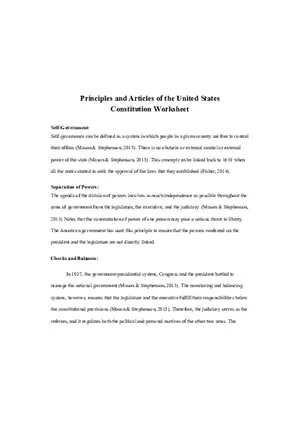Answer Key
Branches of Power Answer Key
-
University:
Fresno Pacific University -
Course:
PS 121 | American Government Academic year:
2019
-
Views:
347
Pages:
2
Author:
Tarime9wn
Related Documents
- Voter Fatigue in Straightforward Decisions A Natural Experiment from a Recall Election
- What, If Anything, Is Wrong with Gerrymandering
- The Pros and Cons of Requiring Citizens to Vote
- Rhetoric & Race Traitors: Charles Mills' Work
- Timeline of Air Quality Policy
- 17.40 American Foreign Policy Lecture Notes: U.S. Foreign Economic Policy
- A More Informative Set of Race and Ethnicity Questions for the United States Census
- 17.40 American Foreign Policy Lecture Notes: Cuban Missile Crisis
- Moral Outrage and Immigration Policy during the Trump Administration
- Greek Influence on U.S. Democracy
- First Continental Patrick Henry Answers
- Patrick Henry's Speech
- Assisted Migration Paper
- Lecture 9: Turkey and Pakistan
- The Spiral Model vs. the Deterrence Model
- Lecture 5 Notes: The Harm Principle
- Three Types of Spirals
- Moderns Between the Greeks and the Romans
- Minneapolis Case Study: NIMBY vs. YIMBY Dichotomy and White Interests
Branches of Power Answer Key


Recommended Documents
Report
Tell us what’s wrong with it:
Thanks, got it!
We will moderate it soon!
Report
Tell us what’s wrong with it:
Free up your schedule!
Our EduBirdie Experts Are Here for You 24/7! Just fill out a form and let us know how we can assist you.
Take 5 seconds to unlock
Enter your email below and get instant access to your document
